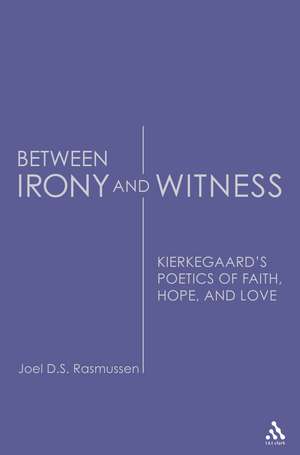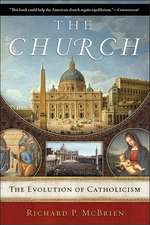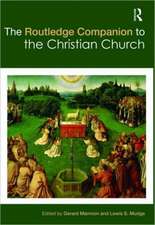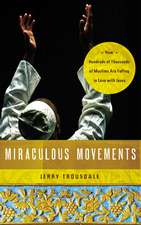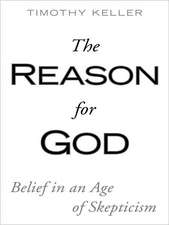Between Irony and Witness: Kierkegaard's Poetics of Faith, Hope, and Love
Autor Joel D. S. Rasmussenen Limba Engleză Hardback – 31 oct 2005
Preț: 947.94 lei
Preț vechi: 1215.84 lei
-22% Nou
Puncte Express: 1422
Preț estimativ în valută:
181.39€ • 193.97$ • 151.24£
181.39€ • 193.97$ • 151.24£
Carte tipărită la comandă
Livrare economică 17 aprilie-01 mai
Preluare comenzi: 021 569.72.76
Specificații
ISBN-13: 9780567028419
ISBN-10: 0567028410
Pagini: 208
Dimensiuni: 217 x 195 x 18 mm
Greutate: 0.45 kg
Editura: Bloomsbury Publishing
Colecția T&T Clark
Locul publicării:New York, United States
ISBN-10: 0567028410
Pagini: 208
Dimensiuni: 217 x 195 x 18 mm
Greutate: 0.45 kg
Editura: Bloomsbury Publishing
Colecția T&T Clark
Locul publicării:New York, United States
Recenzii
Mention -Theology Digest, Summer 2006
Joel Rasmussen reads Kierkegaard as a poet by distinguishing the irony of the secular (Romantic) poet, adrift in possibility, from the religious (Christian) poet, who strives to become actually the ideal he poetizes but remains midway between irony and authentic witness, so that only God, the divine poet, who creates the world and then completes the picture by painting himself into it in Christ, finally reconciles actuality and ideality. This sensitive and subtle reading is an original contribution that contests the earlier approaches of Mackey and Poole and deserves a wide audience. John D. Caputo, Watson Professor of Religion, Syracuse University
"Joel Rasmussen has brought the skills of a philosopher, theologian, literary critic, and literary theorist to bear upon the development of Kierkegaard's thought from its early preoccupation with criticizing Romantic ideas of irony. Thoroughly at home in the now vast English secondary literature, as well as the Danish texts of Kierkegaard, he gives a fresh and dense reading of the major writings, with helpful and surprising insights all along the way. He argues that Kierkegaard's mature view is that God is the true poet in creating a vehicle for loving and being loved by all human beings in Jesus Christ. The ideal human poet, therefore, is not a Romantic creator but rather an imitator of Christ, a witness. The final irony is that no one can imitate Christ to satisfaction, as Kierkegaard judged himself at the end to be a failed poet. This book brings Kierkegaard to the attention of theologians as he has not been since the work of the early Barth." Robert Cummings Neville, Professor of Philosophy, Religion, and Theology at Boston University, and Dean of Marsh Chapel and Chaplain of the University.
"This book goes a long way towards resolving the argument over whether Kierkegaard is primarily a poet or a theologian by taking both dimensions of his thought equally seriously and exploring in a profound way how each of these Kierkegaardian identities contributes to the other. An excellent contribution to Kierkegaard studies." --C. Stephen Evans, University Professor of Philosophy and Humanities, Baylor University
"Rasmussen combines theological interpretation and rhetorical analysis in order to highlight and to illumine key motifs in Kierkegaard's work. His book explores the relation between Kierkegaard's use of poetic imagery and his Christological focus making the book valuable not only for students of Kierkegaard, but also for theologians. Well written, Rasmussen gives a fascinating exposition of Kierkegaard." --Dr. Francis Schüssler Fiorenza Stillman Professor of Roman Catholic Studies Harvard Divinity School
"Between Irony and Witness is a welcome addition to the burgeoning literature on Kierkegaard and should provide the basis for many other fruitful theological studies of Kierkegaard, as it has left much room to extend its analyses." -Journal of Religion
Joel Rasmussen reads Kierkegaard as a poet by distinguishing the irony of the secular (Romantic) poet, adrift in possibility, from the religious (Christian) poet, who strives to become actually the ideal he poetizes but remains midway between irony and authentic witness, so that only God, the divine poet, who creates the world and then completes the picture by painting himself into it in Christ, finally reconciles actuality and ideality. This sensitive and subtle reading is an original contribution that contests the earlier approaches of Mackey and Poole and deserves a wide audience. John D. Caputo, Watson Professor of Religion, Syracuse University
"Joel Rasmussen has brought the skills of a philosopher, theologian, literary critic, and literary theorist to bear upon the development of Kierkegaard's thought from its early preoccupation with criticizing Romantic ideas of irony. Thoroughly at home in the now vast English secondary literature, as well as the Danish texts of Kierkegaard, he gives a fresh and dense reading of the major writings, with helpful and surprising insights all along the way. He argues that Kierkegaard's mature view is that God is the true poet in creating a vehicle for loving and being loved by all human beings in Jesus Christ. The ideal human poet, therefore, is not a Romantic creator but rather an imitator of Christ, a witness. The final irony is that no one can imitate Christ to satisfaction, as Kierkegaard judged himself at the end to be a failed poet. This book brings Kierkegaard to the attention of theologians as he has not been since the work of the early Barth." Robert Cummings Neville, Professor of Philosophy, Religion, and Theology at Boston University, and Dean of Marsh Chapel and Chaplain of the University.
"This book goes a long way towards resolving the argument over whether Kierkegaard is primarily a poet or a theologian by taking both dimensions of his thought equally seriously and exploring in a profound way how each of these Kierkegaardian identities contributes to the other. An excellent contribution to Kierkegaard studies." --C. Stephen Evans, University Professor of Philosophy and Humanities, Baylor University
"Rasmussen combines theological interpretation and rhetorical analysis in order to highlight and to illumine key motifs in Kierkegaard's work. His book explores the relation between Kierkegaard's use of poetic imagery and his Christological focus making the book valuable not only for students of Kierkegaard, but also for theologians. Well written, Rasmussen gives a fascinating exposition of Kierkegaard." --Dr. Francis Schüssler Fiorenza Stillman Professor of Roman Catholic Studies Harvard Divinity School
"Between Irony and Witness is a welcome addition to the burgeoning literature on Kierkegaard and should provide the basis for many other fruitful theological studies of Kierkegaard, as it has left much room to extend its analyses." -Journal of Religion
